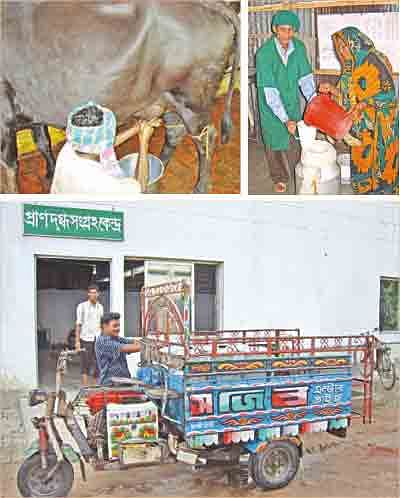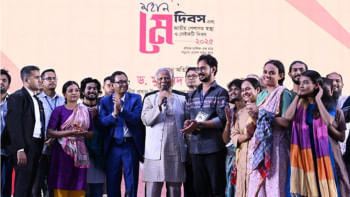Pran makes it big in dairy business

Top Right: A woman sells milk to a representative of Pran, the country's largest agro-processor. Bottom: A man offloads milk containers from a small truck at Pran's milk collection centre in Pabna. Photo: PRAN
MOHAMMAD Noufel Ali pours five litres of milk into a cooling tank and gives his passbook to a young man who records purchases from milkmen in Pabna. Noufel, shrouded in a towel against the morning cold, comes out to a small yard, clearing the way for his elderly neighbour Iman Paramanik.
Paramanik also came to deliver milk to the collection centre set up by the country's largest agro-processor Pran in Dodalia village in Chatmohar upazila in the district. It is one of the 20 centres in 20 villages in the upazila.
“The centre has saved my working hours. Now I do not need to wait hours at the market to get a buyer,” said Noufel who rears two milk-cows.
“I can come anytime of the day to deliver milk and get payment each weekend,” said the 50-year Noufel, from village Dodalia in Chatmohar upazila of Pabna, 235 kms north of the capital Dhaka.
Every morning and afternoon, Noufel, Paramanik, Zahidul and other farmers or their family members come to the centre to deliver milk, contrary to their tradition of going to the nearby markets or depending on middlemen called Ghosh to sell their produce.
This new trend of directly selling to a chilling centre has gained popularity over the past year after Pran established 20 chilling centres in 20 villages of the upazila with a vision to revolutionise milk production in an initiative that Bangladesh sees for the first time.
Dubbed as Pran Dairy Hub, the initiative of setting up collection points to encourage cattle farming and boost milk output has already started bearing fruit.
Milk collection by Pran has doubled in just one year. Establishment of chilling centres by the processor near the farmers has also created a new zeal for cattle farming.
Many farmers have started buying cows and the existing producers seem keen to expand.
Paramanik and Zahidul signed up in cattle farming after Pran set up collection centres in their village.
Ishak of nearby Bhadra area, increased the size of his farm, while another farmer Mohammad Asaduzzaman changed his decision to quit farming.
"I stopped selling cows after Pran set up a collection centre in our village. We used to sell milk to middlemen who gave us Tk 18-20 a litre. But my income from the similar volume of milk has more than doubled," said a 25-year old Asaduzzaman who owns 10 cows.
He said he now earns Tk 17,000 a week by selling milk directly to the collection centre of Pran at Bhadra.
"I have taken farming as permanent business after Pran set up collection centres," he said.
This timely initiative of Pran comes when Bangladesh suffers from a shortfall of domestic milk production due to low productivity per cow of 200-250 litres during a 10-month lactation period.
Industry analysts linked low milk yield to a slow pace in replacement of local cows with the genetically improved ones, a lack of breeding and veterinary services and inadequate investment in feed and fodder development.
In the past decade, production of milk has increased gradually every year because of efforts of farmers and processors to feed the growing demand for milk thanks to economic growth and rise in people's per capita income.
During fiscal 2009-10, domestic production of milk grew 32 percent to 2.36 million tonnes (2,360 million litres) from 1.78 million tonnes in 2001-02, according to Department of Livestock Services (DLS).
However, a huge deficit still forces Bangladesh to import thousands of tonnes of milk powder every year.
In the fiscal 2009-10, total milk shortfall was 10.96 million tonnes, according to DLS.
To reduce the deficit in local milk production, Pran began to organise farmers and set up collection centres in villages of Chatmohar in the middle of last year under its initiative of establishing dairy hubs.
DeLaval and Tetra Pak, which have technical know how and technology on milk production and processing, extended support to Pran.
In line with the target, the processor started providing various extension services to farmers including veterinary care, animal husbandry, dairy housing, quality feed and breed improvement through artificial insemination (AI).
Pran workers give tips to farmers on better housing and feeding management of cows free of cost. It includes keeping cows untied, ensuring light and passage of wind through the shed, always keeping the water jar full to allow cows a drink anytime.
Other services include de-worming and periodical vaccination by maintaining health cards for each cow in its intervention area.
To support farmers to get proper feed for cows, Pran also provides balanced feed prepared at its factory at cost price along with seeds of fodder and training to prepare silage to feed cattle in rainy days.
By importing semen from the US, it also gives AI services to farmers at cost price with the aim to improve existing breeds of cows to scale up milk yield.
In addition, establishment of chilling centres at farmers' doorsteps has cut dominance of middlemen in milk collection allowing producers to get better prices.
Pran's support has helped boost farmers' income by increasing milk production per cow and thus boosted its milk collection from the area to 17,000 litres daily from 8,000 litres before.
With the successes at Chatmohar, Pran now plans to set up similar dairy hubs all over the country with the vision of making Bangladesh a milk surplus country by 2020.
By that year, Pran, which now processes 100,000 litres of milk daily, wants to establish 60 dairy hubs. A second hub has already been set up at Gurudaspur of Natore, another northern district.
The third and fourth are likely to be set up in Rangpur and Sirajganj.
All the hubs will see replication of Chatmohar model where full time veterinary doctors, extension workers along with field supervisors and 20 chilling centres will be accessible by local dairy farmers.
"Here is the sector in Bangladesh which is waiting to be exploited. The dairy sector has immense potential here, but it still remains neglected," said Chief Executive Officer of Pran-RFL Group Amjad Khan Chowdhury.
Sayef Nasir, country director of Tetra Pak, said the initiative of developing dairy hub would help reduce Bangladesh's milk import dependence.
"It is also important from the viewpoint of rising prices of milk globally. Population growth and increased consumption in China is a factor behind the spike in prices of milk," he said.
Nasir said the way forward for Bangladesh is to boost milk output through various efforts including upgrading local breeds of cows with foreign breeds that have higher milk productivity.
"Dairy development has got longer term and wider implications from the perspective of poverty reduction and job creation in the country," he added.
That is what Pran chief Amjad Chowdhury aims to do.
"The only answer to lift people out of poverty is job. Creating jobs in urban areas is expensive due to higher living cost. Cattle farming can help create more jobs in rural areas and reduce pressure of jobseekers in urban areas," he said.
"If people get fair price of their produce, they will be better off," Chowdhury said.
The Pran-RFL Group employs over 30,000 people.
"We want farmers to treat dairy as business instead of treating farming as usual," said Chowdhury.
He said the establishment of dairy hubs, where Pran gives intensive focus, will allow the processor to get more milk.
But the benefits of increased milk production and expansion of cattle farming will go beyond Pran and the whole country will be benefited, observed Chowdhury.
"Cattle farming also offers scope of producing biogas and bio-fertiliser. From cow dung, skin and hide to meat all are useful which makes dairy a profitable investment."
Chowdhury said Pran invests crores of taka in establishing dairy hubs as part of its responsibility to the nation.
"Yes, it (dairy hub) is going to take my money. But once it starts, it will fly," said Chowdhury, who dreams of turning Bangladesh into a milk surplus country.
"This sector is highly neglected, although its development is very much needed for Bangladesh. If I can contribute to developing the domestic dairy sector, it will be my ultimate satisfaction," Chowdhury said.

 For all latest news, follow The Daily Star's Google News channel.
For all latest news, follow The Daily Star's Google News channel. 



Comments